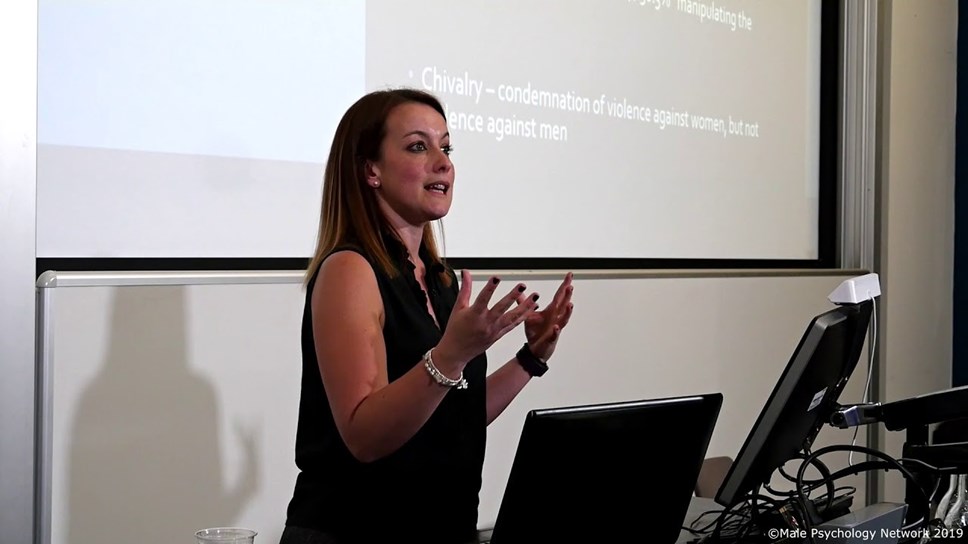
Men's experiences of domestic violence
Recommendations for gender neutral definitions in domestic violence legislation cite her work, which has been hailed for raising the profile of an issue too long hidden – and for reforming understanding of these ‘devastating crimes’.
Thousands of men never talk about their life shattering experiences, yet according to the Office of National Statistics, one in every six to seven is likely to be a victim in their lifetime and face barriers to getting help. However, through a number of ground-breaking projects, Dr Elizabeth Bates has opened eyes to their plight and been a catalyst for change.
She explained: “I have been able to challenge the perception that women are primarily victims and men perpetrators. I am pleased to say my research has contributed to a greater awareness and increasing numbers of men coming forward to seek help and get access to support.”
Her work in bringing a taboo subject into the open has established her position as one of the country’s leading experts. She has advised and appeared in a number of television news features and documentaries.
Dr Bates explained: “It is this sort of exposure which helps to raise awareness of an issue bearing some difficult statistics, namely one in every three cases of domestic abuse, it is a man who is the victim.
“The impact is that in talking about what are deeply troubling experiences, more men come forward – and more support is provided.”
Her research included detailed cases of physical and sexual violence, as well coercive control, where friends, family, finances and children, were brought into the fray with threats of false allegations and gaslighting*.
Unlike previous studies, which may have created barriers for men to come forward to talk about their abuse, Dr Bates used anonymous online surveys to broaden the scope of capturing data on a broad range of experiences.
In a survey of 161 men, a quarter said they had never previously spoken out about their abuse. Follow-up interviews revealed how violence and control continued, and changed, even after separation.
“Ex-partners use legal and administrative systems to manipulate men, resulting in parental alienation, harassment and false allegations, said Dr Bates.
“This was the first study of its kind to explore what happened to male victims after couples parted, and has provided a useful insight into how the abuse continues.”
Dr Bates co-edited the 2019 book, Intimate Partner Violence: New Perspectives in Research and Practice. She has written/co-written a number of other publications on a subject which does not make easy reading.
“Walking on egg shells”: A qualitative examination of men's experiences of intimate partner violence was featured in international journal, Psychology of Men & Masculinities.
Covering trailblazing new research, her latest published paper reveals society still does not readily recognise male domestic abuse victims and some may have lost their lives as a result.
She said investigations had shown that opportunities to help were missed because of
gender bias and outdated stereotypes.
Her studies have proved invaluable to those involved in victim support, including practitioners, services providers and charities, such as the ManKind Initiative, which has also benefited from her critical role in supporting government lobbying.
She has been given The National Men and Boys Award for Public Understanding. Dan Bell, CEO of the Men and Boys Coalition, said her work had quite literally reformed the understanding of men’s experiences of ‘these devastating crimes’.
He added: "There remains a profound lack of awareness, understanding, service provision and even basic sympathy for male domestic abuse victims. Dr Bates’ crucially important work is opening people’s eyes to an issue that has been hidden for far too long.
"On behalf of all of us at the coalition, our deepest gratitude for an outstanding contribution to promoting care, compassion and social change for men and boys in the UK. We couldn't be prouder that she is one of our members."
Her work has also influenced how a number of police forces deal with the issue. Cumbria Constabulary invited Dr Bates to speak at its domestic abuse development day, while Greater Manchester Police said her research had opened up new conversations. When its training school introduced the subject in 2019, it was a very new area.
Across the globe she is hailed as an instigator and innovator, giving a previously unheard voice to those who had suffered in silence. In Canada, she has helped shape public policy and support, while the Australian government was recommended to consider perpetrators of abuse could be male or female.
The breakthroughs have been charted in extensive media coverage including a Daily Mail focus on the subject, which was shared on social media over 8,800 times.
Dr Bates admits it has become a passion that all victim groups should get equal opportunities when it comes to accessing help and support.
She explained: “I first became interested in this area when studying my degree and was in a lecture about women’s violence, it had never occurred to me that women could be violent.
“The more I researched the area, the more I realised there were a significant number of men who were experiencing abuse but had nowhere to go, and faced real challenges in getting help and support.
“The work continues and although attitudes are changing there is still some way to go before the status quo is shifted and people are seen as victims irrespective of their gender.”
- The Office for National Statistics figures show every year that one in the three victims of domestic abuse are male equating to 757,000 men (1.561m women).
- One in 6-7 men and one in 4 women will be a victim of domestic abuse in their lifetime.
*Gaslighting is a term that refers to trying to convince someone they are wrong about something even when they are not.
